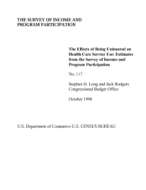The Effects of Being Uninsured on Health Care Service Use: Estimates from the Survey of Income and Program Participation
The Effects of Being Uninsured on Health Care Service Use: Estimates from the Survey of Income and Program Participation
Working Paper Number: SIPP-WP-117
There is growing concern about the number of people in the United States who have no health insurance. For some, the concern stems from the lack of access to health care for the uninsured and its ultimate effect on their health status and productivity. For others the concern arises from a sense that the present system of financing what care the uninsured receive involves cross subsidies and taxation that are inequitable. The rising number of uninsured in this decade -- from about 30 million people in 1980 to 37 million people in 1987 -- coupled with the increasing pressures on providers from private and public sector cost containment are forces that have served to sharpen concern recently.
Others in Series
Working Paper
Nonresponse Research for the SIPP
After providing background on the SIPP, this paper discusses the two currently active nonresponse projects mentioned above and plans for extending the research.
Working Paper
The Seam Effect in Panel Surveys
This paper is concerned with a type of measurement error encountered in panel surveys that has become known as the seam effect.
Working Paper
Food Stamp Participation
This paper compares the distribution of Food Stamp Program participants on selected variables obtained from SIPP and from a survey of administrative records.
Page Last Revised - October 8, 2021




